
OR
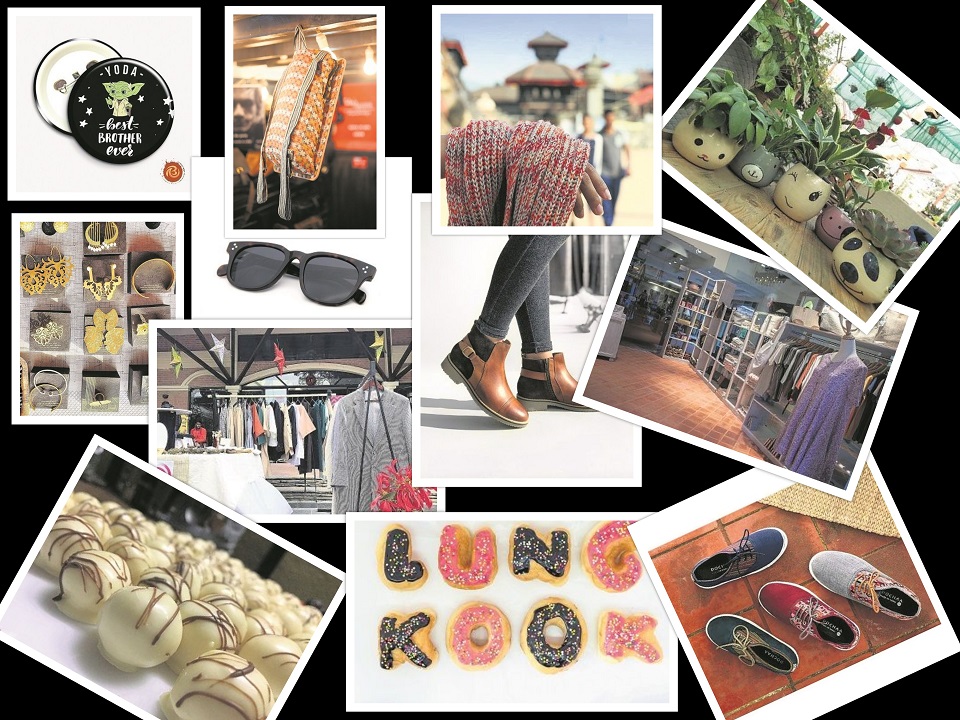
In the past few years we have seen a surge in the #MadeInNepal movement where producers and consumers alike are supporting locally made products and doing their best to give further momentum to this movement as well as shed more light on its importance in preserving the culture and fueling our economy. The annual event, Brand Nepal, aims to do the same thing. This year, the event is going to be held at Chhaya Centre, Thamel on Saturday, December 28, 2019. And 32 Nepali brands are getting together to celebrate this initiative. All the brands involved will have a stall where those interested can buy or inquire about their products. What’s more, most of the brands are also doing giveaways and offering hefty discounts. Circus Kathmandu, artists from Nepal Hip Hop Foundation and a number of Nepali cover artists will be performing at the event. Here we give you a roundup of the Nepali brands that you can shop at the one of a kind event.
Aamo
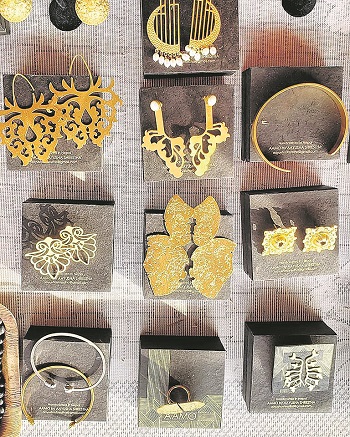
Aamo is a jewelry brand with a wide range of designs for both women and men in brass and silver with gold plating. They also have jewelry designed with natural stones and people who love jewelry will definitely like the modern take designer Aayusha Shrestha adds to them. “As a conceptual jewelry designer, each piece has its narrative and my inspiration for the design is in Nepal’s very diverse culture or my personal experiences,” says Shrestha. All Aamo products are locally handcrafted by artisans around Kathmandu and all of their designs are uploaded on their Instagram page with the caption explaining why and how the product was crafted.
Ekadeshma Clothing

Sisters Anuza Rajbhandari Shrestha and Alpaza Rajbhandari Joshi launched Ekadeshma Clothing in 2011 as a sustainable lifestyle brand. “Made in Nepal wasn’t a mainstream thing back then as it is now. So, us launching this brand was a big gamble at the time,” says Shrestha revealing that the brand started out with only basic t-shirts. Since then, they have moved on to making home decor items and accessories alongside clothing. The team of Ekadeshma comprises of women only and the brand buys about 90% of their fabrics through small-scale local weavers. Their store is located in Thamel but their products are also available at Timro Concept Store, Jhamsikhel and Everything Nepali, Baber Mahal Revisted.
School of Baking and Pastry Technology
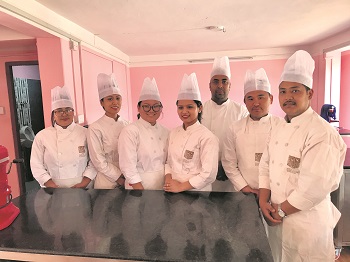
The School of Baking and Pastry Technology is possibly Nepal’s first institute that majors in baking and pastry related courses. The school was launched last year by Sudan Shah and is located in Bhaisepati, Lalitpur and, till date, over 20 students have passed out from the institute. Shah, who is a hotel management lecturer at AITM School of Hotel Management, Quest College and NATHAM college, is also the proprietor of chocolate company—Sudan Shah Chocolate—that makes dark chocolates, jams and marshmallows. School of Baking and Pastry Technology offers two courses—a basic three-month course and a nine-month long diploma course.
Joba Knitwear
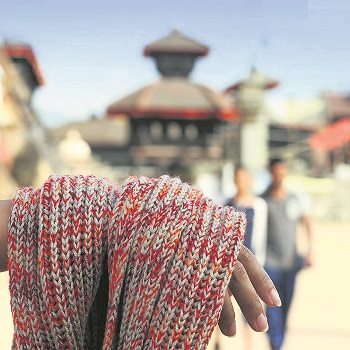
When Shreya Kansakar decided to launch Joba Knitwear in 2015, she was merely carrying the family business forward. Apparently, her family has been in the knitwear business for over three decades and Kansakar, who works full time at Thai Airways, thought letting go of this line of business would be a shame. She decided to name it Joba, after her grandfather’s nickname. The brand produces knitwear of all kinds including sweaters, mufflers, and socks. Joba Knitwear’s factory is located in Kaushaltar, Bhaktapur. They don’t have an outlet of their own yet but you can find their products at Dhuku Store, Maya Ko Chino, and Daraz.
Hotse Hainse

Hoste Hainse is a non-profit non-governmental organization that was launched in 1990 by Sulochana Shrestha-Shah with the initial purpose of ensuring sound working conditions for the employees of its sister company, Formation Carpets, that manufactured hand knotted rugs. Later, in 1995, Shrestha-Shah also launched Goodweave, an organization that focused on ending child labor—especially in the rug manufacturing industry, alongside Kailash Satyarthi (the 2014 Nobel Peace Prize Laureate). Hoste Hainse currently runs four schools in four villages of Sarlahi. Hoste Hainse also provides educational support to schools in Jhapa, Nawalparasi and Bajura in collaboration with other organizations, namely, Chance for Life Nepal, Nepalhilfe Bietigheim-Hersfeld and Zukunft Entwickeln.
Looga Wears
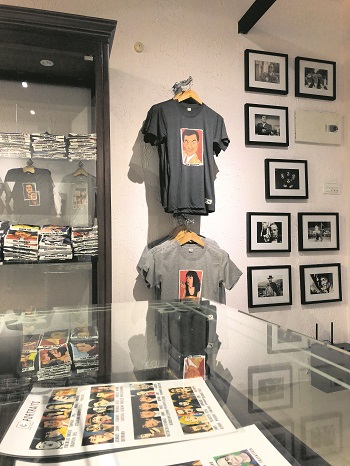
Looga Wears was born out of its founder Senate Shakya’s love for pop culture. It’s a new brand, launched in July this year, with an outlet at Chhaya Centre in Thamel. For the first five months of operations, Looga Wears actually only sold imported clothing that had pop culture references. But starting this December, Looga Wears will be producing their clothing here in Nepal. Although they only sell t-shirts and hoodies right now, Shaky mentions that he will be adding sweatshirts and sweaters in the store’s product lineup within this year. The brand is particularly popular on Instagram and Facebook for their patchwork designs—as instead of printing designs straight onto the clothes, they print it on a separate fabric and later stitch it on the clothes.
Kalpa Production
A severely underrated food production company, Kalpa Production is a brand that every Nepali food enthusiast should know about. Bishnu Kala Rai, founder of the brand, launched the company only about two months ago but they are already making quite a buzz among their customers. The brand primarily makes Nepali food items as Rai thinks promoting traditional food is very important—especially in this day and age when most youth prefer fast foods and western cuisines over Nepali food. Besides selling food items like sel roti and phapar ko roti, they also utilize Nepali grains to make other foods like cakes and donuts. The brand doesn’t have an outlet of their own and isn’t on any social media yet but they do occasionally take part in weekly markets (haat bazar).
July Clothing
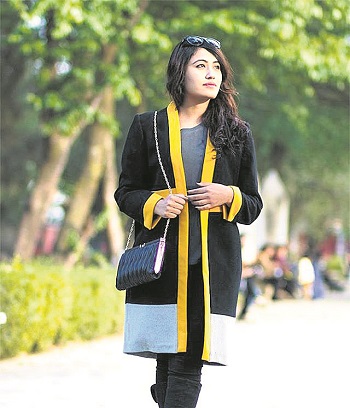
Husband and wife duo, Amit Shrestha and Rujala Dahal, started the clothing brand July to promote the #MadeInNepal movement way before the movement even became a bit popular—back in 2013. Shrestha looks after the marketing of the brand while Dahal is the creative director who works with four other designers to finalize the designs of their products. They named it July because they launched it in the month of—yes, you guessed it—July. Shrestha mentions that the brand started out very small—only selling formals for women. Now, they have expanded their lineup and produce all kinds of women’s clothing. July has three outlets in Kathmandu—at Naxal, Pulchowk and New Baneshwor, and you can also find their products at Daraz and SastoDeal.
Shibori Nepal
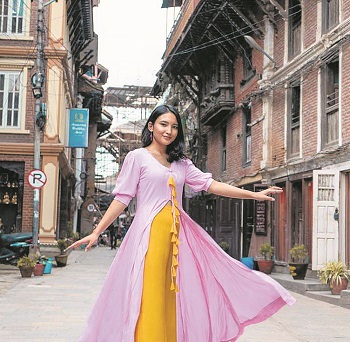
Although they started out with just making customized t-shirts online, Shibori Nepal gradually expanded as a brand and launched a concept store of their own in Jhamsikhel, Lalitpur last summer. Arshiya KC, founder and owner of the brand, calls Shibori a made in Nepal brand that is waywardly trying to revolutionize the clothing industry in Nepal. She adds that the company views garments more like an art form and all of their pieces are handmade by utilizing resources available in Nepal. KC reveals that the Shibori team gets the inspiration for the design and style of their products from the current trends and just everyday life in general. Once they come up with a design and conceptualize it, they discuss the viability of it, and only then do they stitch it.
Bora Studio

Always the artistic kind, Meena Gurung believed in making her own crafts and rarely bought off the shelf products for either gifting or personal use. Her clothing line, Bora Studio operates on a similar principle—everything that Bora Studio produces has Gurung’s touch and is reflective of the ideals she lives with—being connected to nature and keeping it simple. Bora Studio is a slow fashion, environmentally responsible clothing brand that uses natural fabrics and dyes. The idea is to make products that have high utility value and produce them with the least environmental cost. To make tote bags, shawls, casual wear and formal wear, the studio uses cotton canvas, hemp, bamboo fabric and eco printing methods. This, Gurung says, is to promote Nepali fabrics as well as shifts people’s attention from fast fashion to sustainable and ethical fashion.
Bishrom Eyewear

Bishrom is a Nepali eyewear brand founded by friends Bishal Basnet and Sanin Bajracharya in 2015. Their products are designed in Nepal—specifically to suit the Nepali lifestyle. During the final semester of their BBA program, Basnet and Bajracharya were looking to start their own entrepreneurial project. They found out that good quality and affordable sunglasses weren’t available in Nepal. “At the time, only two types of glasses were available in the Nepali market. You could either choose to buy the expensive branded glasses—which were out of most Nepalis’ budget—or buy cheap knock offs that were of really bad quality,” says Basnet adding that their company is bridging this gap and proving that good quality glasses don’t have to be expensive. Bishrom currently sells sunglasses and prescription glasses and has outlets in New Baneshwor and Labim Mall.
Studio Sarcastic
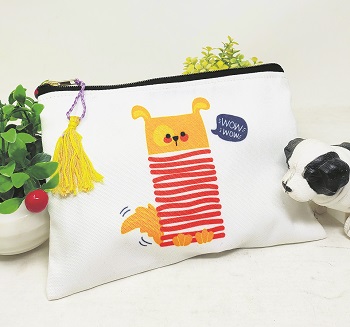
An online store, Studio Sarcastic began in early 2017. Sneha Koirala, founder of Studio Sarcastic, had made a poster for a friend for the newly released The Fantastic Beasts movie when members of ‘Potterheads Nepal’ (a group of Harry Potter fans) saw it and placed a lot of orders. “One of the girls in this group encouraged me to open an Instagram account and everything took off from there,” she says. Even before that, with a few doodles and sketches here and there, Koirala had been creating comical characters on her notebook. “I have always been a big fan of comics. I love developing one-liner comics and had always wanted to own creative products seen on the internet—that weren’t previously available in Nepal. So, I started making such products,” she says. Now, the company sells a range of posters, bookmarks, notebooks, planners, mugs, shot-glasses, coasters, phone-covers, bags, tees, tumblers, and greeting cards.
Kala Kathmandu

Founder Astha Rajbhandari calls Kala Kathmandu a multi-disciplinary studio working at the intersection of Art, Design and Technology. The studio was started in late 2015 by Rajbhandari and her partner, Pooja Rimal. Rajbhandari says that when she graduated from her Industrial and Product Design course abroad, she realized that not many people in Nepal know about product design. At the time Rimal was already in the manufacturing business, working for CNC Craft Nepal, but she wanted to exercise her creative side more. The two got together and came up with Kala Kathmandu whose manufacturing unit is currently located in Chakrapath, Maharajgunj. The studio doesn’t have an outlet of its own as of now but their products are available either through their social media and website or at a number of concept stores and markets in Kathmandu including Local Project Nepal, Le Sherpa and Dhuku Store.
Pinches Artcore

Shreya Joshi founded Pinches Artcore, a company that specializes in customized gifts, in early 2018. The brand is an outcome of her fascination with arts and designs. “I love paintings. It has always captivated me because it has that ability to attract people. You could say it’s the love for arts that made me establish this brand,” says Joshi adding that she began the venture as a one-person army. During the start of Pinches Artcore, she did everything herself—painting, designing, digital printings, handling the social media and the administrative work—but now she has a bigger team that works with her. The brand has an outlet in Durbar Marg and the cute and customizable merchandise like pillows, cups, keyrings, etc. that they have here bring out the shopaholic in just about everyone.
Kira Store

With modern fashion slowly taking over the world, Kira Store Nepal, the brainchild of the couple Upendra Singh and Aboo, aims to create new designs by merging contemporary style with ethnic techniques from around East Asia, including Nepal. Bringing together different skills from different countries, the Nepali brand is an amalgam of all things beautiful. And it helps that the couple has traveled to over 25 countries. The cultural experiences they have had led to ideas and pieces that would have otherwise never seen the light of day. Kira Store Nepal only sells handmade items and unique products of different designs ranging from bags, dresses, baby clothes, earrings, wallets, necklaces, bracelets, etc. One of the good things about Kira Store Nepal is that the products are affordable. The prices range from Rs 50 to Rs 2500 with the latter being the highest price for any product at the store that is located in Durbar Marg in Kathmandu.
Kallisto Designs
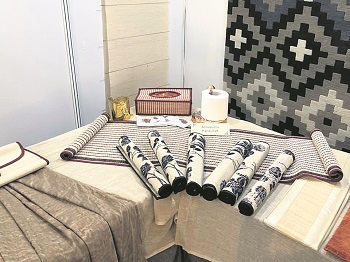
Anu Shrestha is the founder and designer of a made in Nepal brand that has been gaining steady popularity in the recent times. Kallisto Designs is her clothing brand that makes amazing hand-painted silk wears and accessories. In Greek, Kallisto means ‘the most beautiful’ and Shrestha claims her designs are nothing less than that. Every design she creates is made of hand-painted silk and she personally ensures that the quality of each product is carefully monitored and thus up to the mark. The Kallisto Designs’ studio, located at Red Cross Marg in Kathmandu, has a huge collection of hand painted silk saris, kurtas, tops, and kaftans. Although Shrestha has been working in this industry for more than two decades now, Kallisto Designs was only established two and half years ago. But in this short span of time, the brand has been able to establish its identity and is known for its high quality products.
Kolpa

If you are looking for durable bags in a variety of styles and designs with a touch of Nepali culture, look for products made by Kolpa. This is a Nepali brand that primarily makes bags of all kinds—including handbags, backpacks, and tote bags. Although the company started working actively since 2014, its founder Rabi Malla had registered and started working on the concept of Kolpa from 2006. Malla wanted to run a company that would use Nepali resources to make functional products with traditional Nepali techniques. Since their launch, they have also explored the home decor market and make products like lamps, rugs, baskets and accessories. Their outlet is located in Jhamsikhel, Lalitpur but buyers can also place their orders online and through social media.
Lakhey Nepal

Erina Shrestha launched her clothing brand, Lakhey Nepal, in September 2018 with its very first collection for Autumn-Winter 2018 that had 20 designs. Shrestha, who is also the designer of the Lakhey, says that the main priority of the brand is to promote Nepali fabrics like cotton, bamboo, banana, and hemp. “We design our own fabrics, its colors and pattern for our collections,” says Shrestha adding that all of Lakhey’s products use these fabrics to make contemporary clothes that can be worn on an every day basis. The brand has an outlet in New Road but most of their sales happen through their social media pages.
Badge Nepal
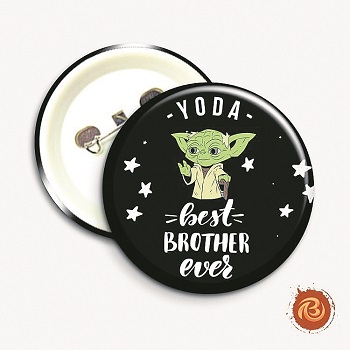
These days, there are lots of brands that have started producing trendy and funny badges. One such brand is Badge Nepal. Founded by Anil Udaya in 2018, Badge Nepal specializes in creating badges whose designs express emotions in an artistic and trendy way. “Our brand is an amalgamation of art and funny ways of expressing,” says Udaya, who is a designer by profession. Although Badge Nepal is steadily becoming popular by the day among young people online, Udaya is a little disappointed that this rise in the brand’s popularity has been slower than he expected it to be. Despite their online presence, Badge Nepal doesn’t take online orders or deliver products to their customers because, most of the time, the delivery charges end up being more than what buyers have to pay for their orders.
Dulla The Factory Team

Dulla The Factory Team is a leather footwear brand founded by Ahmed Dulla in 2011 and has changed how we view shoes manufactured in Nepal. All the products are designed by Dulla himself, who completed a diploma in ‘Footwear Technology’ from FDDI, Noida, India. The brand started with producing leather shoes and then moved on to crafting and selling leather wallets, bags and belts—with the intention of upgrading products one at a time rather than doing everything at once. Dulla wishes to upgrade his work and bring more growth in the leather business. “The company has been operating online since the beginning and as more and more people started liking and buying our products, we have also opened some retail stores now,” says Dulla adding that he wishes to open more outlets of Dulla The Factory Team in Kathmandu and around Nepal.
Dochaa

Dikesh Prajapati, Amuda Mishra, and Watsal Rajbhandari were once discussing the importance of traditional arts and culture in Nepal over a cup of tea and that’s when they came up with the concept for Dochaa, which are basically shoes worn by inhabitants of the Himalayan region in Nepal. Authentic traditional designs on comfortable modern sneakers is now Dochaa’s modus operandi. Their products are solely handcrafted by local artisans and reflect Nepal’s culture and aesthetics. “We wanted to make something that the current generation would like,” says Prajapati adding that their shoe company, Dochaa, wants to create a brand that’s the perfect fusion of arts and luxury. Preserving our cultural essence while empowering the community.
Sumukhi Handicrafts

Adding a modern touch to traditional Nepali architectural designs, Sumukhi provides its customers with a wide array of handmade products. Their meticulously designed products reflect the beauty of Nepali heritage. And each product is creatively handcrafted incorporating medieval Nepali style. Friends Ashesh Kumar Pradhan and Roli Mittal Jalan established Sumukhi in 2016 with the primary motive being to preserve the genealogical essence of Nepali designs created by traditional architectures as well as ciphers. They also intend to conserve traditional architectural designs that may be forgotten in the near future. “We named our brand Sumukhi which means mirror in Sanskrit. These products actually reflect our authentic lifestyle,” says Pradhan. The brand is completely operated via their social media pages and website but you can find their products at Timro Concept Store and KTM Haat Nepal.
I Am the Gardener
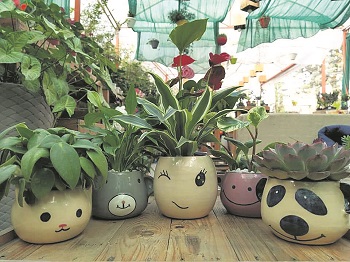
Kewal Risal and Biraj Khadka, owners of I Am the Gardener, identify themselves as plant lovers. Plants, they explain, are more than just what they appear. They are the appeasers to long tiring days, a companion in lonely hours, and a miracle of nature. Initially, Risal and Khadka began with online selling. From their presence on social media and exposure from exhibitions, they felt the need for an outlet. Today, I Am the Gardener has an outlet of its own in Dhumbarahi, Kathmandu. Built as a greenhouse of sorts and comprising of a recently constructed plant library, this is where plant enthusiasts learn the basics and specifics of plant rearing.
Danfe Chocolates

Danfe Chocolates is a brand new chocolate brand launched by Navnishan Bakery. Although it has been over four years since the launch of the bakery, its two founders Sushant Tuladhar and Nimesh Ulak, haven’t opened an outlet for it. Instead they take orders online and through phone calls and Ulak, chef and patisserie of Navnishan Bakery, prepares everything at his own house. The bakery prepares a variety of items including birthday cakes, muffins, and pastries while its chocolate brand specializes in dark chocolates. Tuladhar mentions that because preservatives aren’t added to Danfe Chocolates, their shelf life is pretty short.
Today’s Telegram
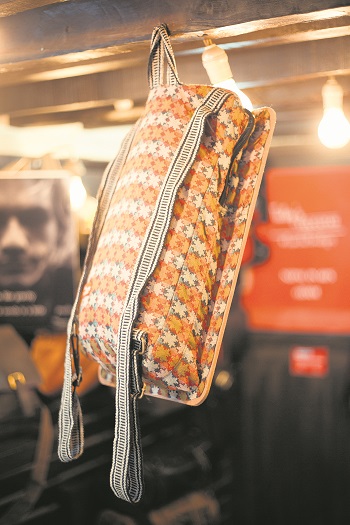
Today’s Telegram is a start-up that specializes in leather bags, sleeve bags, eco-friendly yoga mats, and many more such items. The brand launched its first store on April 25, 2017—on the second anniversary of the mega earthquake of 2015. The founder of the brand, Arsalan Akhter, reveals that the brand utilizes leather and eco-friendly fabrics that are found in Nepal to produce creative products that are stylish and practical. Very often, the brand collaborates with artists and people in the creative field to come up with new collections. Till date, they have opened three outlets in Kathmandu—one at Pulchowk, the other at Baber Mahal, and the last one at Freak Street in Basantapur.
Dip In Donuts

It has only been about 18 months since Manjil Shrestha and Safina Manandhar launched Dip In Donuts but the eatery has already become one of the most popular dessert destinations in Kathmandu. The idea for the business came about as Shrestha was looking into the Nepali market to see what kind of entrepreneurship venture would work well here. He soon realized that there aren’t many—if any—eateries that specialize in donuts and its varieties. So, he consulted his sister-in-law, Manandhar, who had just finished her Hotel Management course and the two opened Dip In Donuts together. Right now, the eatery has two outlets—one in Baluwatar and the other in Timbahal—but Shrestha mentions that they are planning to launch a few more outlets soon in the near future.
Nuga:

Nuga: is a brand that manufactures personal care products. Founded by Suyash Shrestha and Rasana Shrestha, Nuga: has been striving to make and sell natural, free of artificial chemicals as well as edible cosmetic products. These products are made using local materials found here in Nepal. Though Nuga: was conceptualized in 2016, the company was officially launched in 2018, after two years of thorough research on making all natural personal care products. The main aim is to manufacture and sell products using traditional skin care methods and recipes which have become almost obsolete, in order to reinvent them and introduce them in the modern market. Currently, Nuga: sells about nine different kinds of personal care products like lip scrubs, body scrubs, soaps, and face scrubs.
You May Like This
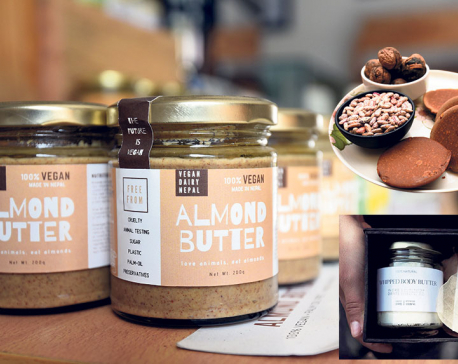
Organic options
With more and more people talking about how products should be organic, sustainable and eco-friendly, it isn’t a surprise that... Read More...
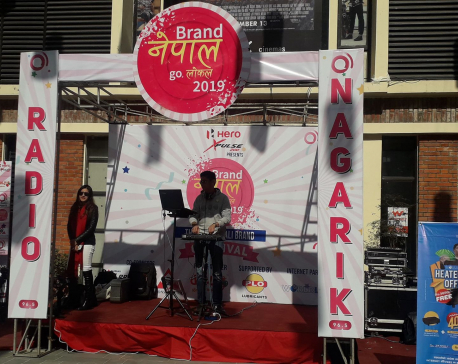
'Brand Nepal Go Local 2019' being held in Kathmandu
KATHMANDU, Dec 28: Hundreds of visitors have flocked to 'Brand Nepal Go Local 2019’, a Nepali brand carnival organized by... Read More...
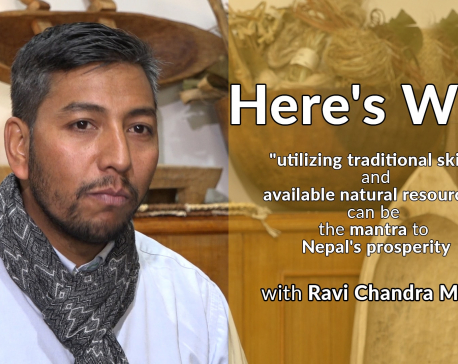
Going local with a vision for a prosperous Nepal (with video)
Nepal's history of sustainable use of resources by our ancestors finds continuity in traditional skills utilized by various communities to... Read More...




Just In
- Health ministry to conduct ‘search and vaccinate’ campaign on May 13
- Indian customs releases trucks carrying Nepali tea, halted across Kakarbhitta
- Silent period for by-election to begin from midnight
- SC issues short-term interim order to govt and TU not to take immediate action against TU legal advisor Khanal
- National consultation workshop advocates to scale up nutrition smart community in Nepal
- Patan High Court issues short-term interim order to halt selection process of NTB’s CEO
- NEPSE inches up 0.15 points; daily turnover increases to Rs 2.53 billion
- Bagmati Govt mandates tri-lingual signboards in offices














Leave A Comment